
[U.S. Attorney John Walsh points to a fireball created when an exploding target denoted. CPR Photo: Pat Mack]
At a news conference Monday, authorities showed a video of a test conducted by the U.S. Forest Service of what can happen when an exploding target is shot.
A woman's voice can be heard counting down to one. A shot is fired and the target denotates.
"When you shoot these, they blow up, and they blow up pretty spectacularly, which is why they’re popular," U.S. Attorney John Walsh said.
But Walsh says they also can spark wildfires. In the video, a nearby bale of hay quickly caught fire when an exploding target detonated.
That threat of fire is why federal officials are banning the targets on forest service land in the Rocky Mountain region that includes Colorado, Kansas, Nebraska, South Dakota and Wyoming.
Since 2012 the targets have caused three fires in Colorado and a total of 16 in 8 western states. Walsh says the cost to fight them was about $33 million.
"The reality is you don’t want to have on your conscious starting a huge forest fire," he said. "You don’t want on your conscious or frankly the possibility of bearing legal responsibility for a forest fire that once it gets going ends up burning houses, burning businesses burning not only the forest but puts firefighters at risk. And god forbid that someone actually gets injured or killed."
The targets are legally sold online and in sporting good stores in small plastic containers. They generally contain two substances that are not explosive on their own. The substances become explosive when mixed. And Laura Mark, special agent in charge for the US Forest Service in the Rocky Mountain Region, says unexploded mixed targets left behind can also pose problems.
"We have had to call as bomb squad to come and dispose of those things because they’re not safe to handle and we are not trained nor are we equipped to deal with that," Mark said. "So that’s another issue that is a concern for the forest service and use of these things on forest service land."
One of the major manufacturers in the field, Tannerite Sports, says while some competitors’ products can start fires, its exploding targets cannot. Dena Woerner, a spokeswoman for the company, says Tannerite might fight the ban in court.
"Tannerite Brand exploding targets are non-incendiary," she said. "Detonations occur at a very high velocity producing a very large explosion and a cloud of water vapor."
But the U.S. Forest Service considers all brands a fire risk, and banned all of them for a year. It will now create regulations to bar them from forest service land permanently.
But Bill Brassard, with the National Shooting Sports Foundation, the trade association for the firearms industry, calls a permanent ban unwarranted.
"Hot and dry conditions and the potential for wildfires warrant restrictions like this for temporary periods but we would really have to take a close look as to why a permanent ban would be thought about," he said.
The ban on forest service land in the Rocky Mountain region adds to one already in place in the Pacific Northwest. Anyone caught using an explosive target on forest service land could face fines of up to $5000 and up to six months in prison
The Bureau of Land Management is also considering a similar ban.







